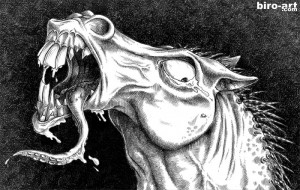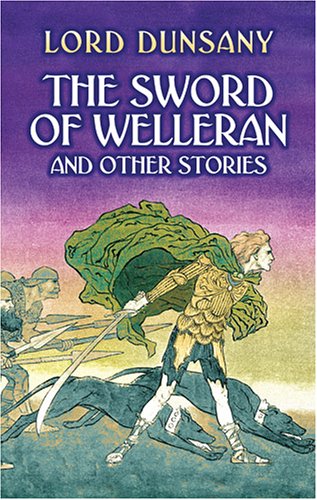The Birth of the Nightmare
 The sound of rapping at the door barely interrupted the thunderous downpour. After the proprietor peered through the iron peephole and made out the huddled form, he let the stranger in. A drenched Glenillyn from the Northlands passed the threshold, introduced himself, and asked for shelter at the house of Traer in the Southlands. He was carrying a bridle round his neck and spurs dangled from his belt.
The sound of rapping at the door barely interrupted the thunderous downpour. After the proprietor peered through the iron peephole and made out the huddled form, he let the stranger in. A drenched Glenillyn from the Northlands passed the threshold, introduced himself, and asked for shelter at the house of Traer in the Southlands. He was carrying a bridle round his neck and spurs dangled from his belt.
After a frugal supper filled with rich conversation, Glenillyn inquired as to what service he could render to repay Traer’s hospitality. The dark host sat silent for some time, then he said to his guest, “I ask nothing of you save you bring me the prized mare held by my neighbor to the west. He guards her with such precision that for months all my attempted ambushes have been in vain.”
Glenillyn said, “You in the South are certainly slow and cowardly by our standards. We would have made an attempt to get her and even have died rather than hang about for moons. Tell me where she is and wait here over the next night and see how I do.”
Said Traer, “We know all about the boasting of your people. Cadwallon, the son of Uther, has the mare at Gelligaer. She feeds by day in the midst of soldiers. At night she slumbers on a fine brachan[1] in the far corner of his house, with the whole household between her and the only door and four of his best men between her and the fireplace. In addition to repaying my hospitality, you shall get ten cows for the mare and five for the brachan.” Traer strolled up unconcernedly to the face of Glenillyn, as no thief in the Southlands is arrested but is instead killed on the spot, so if the traveler were seen again it would mean success and he would have his prize. Glenillyn nodded, took his rest, and in the morning set forth to retrieve the mare.
The night was dark and starless as Glenillyn approached Gelligaer. With his knife he made a hole beside the door and let himself in. He stole up to the mare and loosed her. Then, with the lashing skills of the seamen of the north, he tied the fringes of the carpet to her tail. The four men were sleeping on the carpet and following Glenillyn’s lead, the mare dragged the guards bodily through the fire, which consumed them immediately and with nary a shriek, their ashen corpses covered the rug as it was dragged outside the door. Cadwallon’s remaining band set out after him, guided by the sparks. These Glenillyn quenched, and mount and robber rode off into a nearby field. Just before dawn, he returned to Traer safely, handed over the mare, received the cows and gained for himself great renown for daring as against the men of the Southlands.
Unfortunately for both men, the story doesn’t end there. The mare herself sustained burns passing through the fire that night. The ashes of the corrupt guards wore into the sores opened by the flesh wounds, infecting the mare with the evil intent that an unjust death does. The next night, she broke free of the stables of Traer, breathing fire as bright as ever from the hearth of Cadwallon at her captors, her flesh still rotting yet clinging to her animated frame. She galloped off across the land, set free by her power. From the prints where her hooves stepped that night, no plant has since grown.
It is said she has bred many more mares in her corrupted image. On starless nights, beware the whinnies that wind through the dells of the Southlands and the haunted dreams of men.
Inspired by the Welsh legend of Genillyn, the Thief of Glamorgan.
Posted in Fiction and tagged fiction, hook seed or legend by Stephen Hilderbrand with no comments yet.
Lord Dunsany’s The Sword of Welleran and Other Stories
 The Sword of Welleran and Other Stories is the influential third book by Irish fantasy writer Lord Dunsany, aka. Edward J. M. D. Plunkett. Dunsany’s stories have been major influences on the work of J. R. R. Tolkien, H. P. Lovecraft, Ursula LeGuin and many others writing fantasy today. This collection of stories was first published in hardcover by George Allen & Sons in October, 1908, and has been reprinted a number of times since.
The Sword of Welleran and Other Stories is the influential third book by Irish fantasy writer Lord Dunsany, aka. Edward J. M. D. Plunkett. Dunsany’s stories have been major influences on the work of J. R. R. Tolkien, H. P. Lovecraft, Ursula LeGuin and many others writing fantasy today. This collection of stories was first published in hardcover by George Allen & Sons in October, 1908, and has been reprinted a number of times since.
Some of the short stories in this collection are linked by Dunsany’s invented pantheon of deities who dwell in Pegāna, which were the focus of his earlier collections The Gods of Pegāna and Time and the Gods. One of the stories, “The Fortress Unvanquishable, Save for Sacnoth,” was afterwards (1910) published by itself as a separate book, a now very-rare “Art-and-Craft” style limited edition. A scene from “The Highwaymen” is very similar to a scene I’d written a few weeks back in one of my Proppian adventures.
To me Dunsany is a true master of the fantastic form. His collection, The Hashish Man has been a major influence on my writing and my own thinking about creating interesting characters in role playing games since I first read it back in 2000. This heightened imagination continues to inspire me to this day.
This collection is well worth finding at a used book store for $2 (thanks, Half Price Books!), but also available for free online at Project Gutenberg. Check it out for inspiration in your fantasy role playing games.
Posted in Uncategorized and tagged fiction, inspiration by Stephen Hilderbrand with no comments yet.